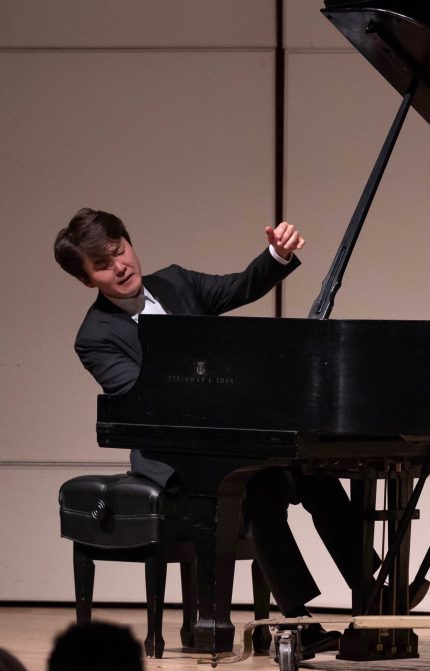Chopin winner Seong-Jin Cho makes a rock-star Chicago debut
The Chicago debut of Seong-Jin Cho, at Mandel Hall Friday night, proved a major event—musically and perhaps sociologically.
Gold Medal winner of the 2015 Chopin Competition, Cho immediately became a classical rock star in his native South Korea. His rapid ascent was aided by a high-powered Deutsche Grammophon contract and a swelling of national pride in his being the first Korean winner of the venerable Chopin Competition. Clearly, the slender 24-year-old pianist’s youthful good looks don’t hurt either.
One got a strong sense of Cho’s remarkable popularity with Friday’s turnout in Hyde Park, as the usually low-key University of Chicago Presents venue took on the trappings of a Hollywood red carpet. The regular UC audience was swelled by Cho fans—predominantly Asian, young and female—who were buzzing excitedly in the lobby before the concert. Afterwards, Cho graciously stayed for over an hour to take photos with his admirers and sign CDs of his recordings. The queueing multitude stretched the length of the long lobby, from Mandel Hall out the doors to 57th street.
So, what about the playing?
Cho clearly possesses a world-class technique, polished to a high sheen. His arsenal is complete and unassailable, the pianist vaulting through some of the most technically demanding repertoire with guns blazing and nary a slip. Friday’s concert offered about as thrilling a display of sheer powerhouse keyboard bravura as one is ever likely to encounter.
With Cho’s program centered more on flashy display, the poetic qualities and interpretive distinction proved more intermittent, oddly for a Chopin winner. Still, there was sufficient evidence of deeper qualities to suggest that Cho has it in him to grow into a truly outstanding artist.
Yet there were moments when some nascent performance mannerisms —hair-tossing chords and a victorious raised arm after final fortissimos— made one concerned that this much adulation coming this quickly might lead the pianist down a dubious, Lang Lang-like path of showbizzy glitz and musical eccentricity. Hopefully, his teachers, those guiding his career, and Cho’s own internal artistic GPS will prevent that from happening,
There was no easing in with Haydn or Mozart. Cho leapt in at the deep end of the pool with the Chromatic Fantasy and Fugue, one of Bach’s most challenging keyboard works.
In the opening recitative, the pianist showed an impressive array of nuanced dynamics. The ensuing fantasia was undeniably spectacular, Cho throwing off the runs and explosive arpeggios with seemingly effortless ease. The concluding fugue went with comparable force and vitality, the welter of contrapuntal voices emerging with striking clarity and built up to a dazzling coda.
There was no easing up on the throttle with the next selection, Schubert’s “Wanderer” Fantasy in C major— a four-section, keyboard mini-symphony in all but name. Cho launched the insistent main theme with a powerful attack and muscular style that characterized his interpretation. In this most pyrotechnical of Schubert’s piano works, Cho was fully in his element, handling all the volleys and brilliant cascades with astounding accuracy and panache.
Just when one was thinking that Schubert’s lyric charm was getting lost in the shuffle, Cho wove a spell with the somber appearance of the “Wanderer” theme, mining a plaintive expression in the inward variations. The return of the main theme had a sense of inevitability and the massive fugal coda was thrown off in thrilling fashion with coruscating brilliance.
A set of Chopin Nocturnes at that point would have given a fuller idea of Cho’s poetic sensibility, but the pianist opted for the Polish composer’s late Polonaise-Fantasie in A flat. Cho took the dramatic opening section in an epic, boldly projected fashion (and, at times a surprisingly heavy left hand). Yet with the Poco piu lento middle section, we at last heard the qualities that the Warsaw judges did—lovely, reflective playing where time seemed to stand still, rendered with tender delicacy and an elastic rubato.
As impressive as the first half was, Cho managed to exceed himself with Mussorgsky’s Pictures at an Exhibition after intermission. The power and virtuosity were there, of course, but Cho also manifested a wider sense of the colors and expressive possibilities inherent in this kaleidoscopic showpiece.
“Gnomus” was aptly malign and atmospheric with a lurking danger, “The Old Castle” moody and atmospheric, “Tuileries” fleet and charming. The only miscalculation was Cho’s garbled “Chicks in Their Shells,” all of whom seemed hopped up on methamphetamines at his impossibly fast tempo.
The portraits of “Two Polish Jews” were vividly characterized and differentiated, “Limoges” witty and dazzling. In “Catacombs” Cho drew out an unsettling sense of sepulchral menace.
The high-flying brilliance of “Baba-Yaga” proved a tour de force of remarkable prestidigitation. Cho rounded off his performance with a “Great Gate of Kiev,” that was notable not only for sonorous weight and cumulative sonic impact, but for the touching intimacy he brought to the Russian Orthodox qualities of the contrasting section.
The enthusiastic ovations brought Cho back for two encores. First was Tchaikovsky’s “October” from The Seasons, rendered by the pianist as a lilting, intimate reverie.
Cho closed the evening with music that showed his Chopin bona fides: the Polonaise in A flat major, given a robust yet playful performance that exhibited a panoply of dynamic and expressive detailing.
The University of Chicago Presents continues with Cappella Pratensis 3 p.m. November 11 at the Logan Center. chicagopresents.uchicago.edu
Posted in Performances






Posted Dec 09, 2018 at 4:57 am by IVAN PRIAULX
A well written review, which certainly made me feel I was there ‘in spirit’ if not unfortunately in fact. From time to time, but not very often, an exceptional young concert pianist arrives to ‘amaze and delight us like Daniil Trifonov. Young Cho could be the next one with maturity.